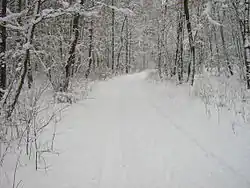ziema
Latvian

Ziema
Etymology
From Proto-Balto-Slavic *źeimāˀ[1], from Proto-Indo-European *ǵʰéy-m-, *ǵʰi-m- (“winter; snow”). Some researches suggest that this stem may have originally meant “(cold) rain period” (cf. Hittite 𒄀𒈠𒀭 (“winter”), [Term?] (/he(y)u/, “rain”) and Sanskrit हेमन्त (hemantá, “winter”), हिम (hima, “cold, frost, snow”)). Cognates include Lithuanian žiemà, Old Prussian semo ([zemo]), Old Church Slavonic зима (zima), Russian зима́ (zimá), Belarusian зіма́ (zimá), Ukrainian зима́ (zymá), зіма́ (zimá), Bulgarian зи́ма (zíma), Polish zima, Sanskrit हेमन्त (hemantá, “winter”), Ancient Greek χεῖμα (kheîma), Latin hiems, Ossetian зям (zjam).[2]
Pronunciation
- IPA(key): [zìɛma]
Noun
ziema f (4th declension)
- winter (season of the year between autumn and spring, from December 23 to March 22 in the Northern Hemisphere, characterized by the lowest yearly temperatures)
- auksta, barga ziema ― cold, harsh winter
- maiga ziema ― mild winter
- bezsniega zeima ― snowless winter
- iestājas ziema ― winter has begun
- ziemas vakars ― winter evening, night
- nākamajā ziemā ― (in) next winter
- dziļa ziema ― deep winter (i.e., with a lot of snow)
- ziemas saulgrieži ― winter solstice
- pēc garās ziemas, kas bija sākusies novembrī un vēl aprīlī negribēja aiziet, atnāca pavasaris, jo nav tādas ziemas, kurai reiz nesekotu pavasaris ― after a long winter that had started in November and in April still didn't want to go, came spring, because there is no such thing as winter which is not followed by spring
- (in the genetive, used adjectivally) winter, typical of winter, used in winter
- Ziemassvētki ― Christmas (lit. winter holiday, festival)
- ziemas dārzs ― winter garden (a room for plants in the house)
- ziemas guļa ― hibernation (lit. winter sleep)
- ziemas sports ― winter sports
- ziemas olimpiskās spēles ― winter olympic games
- ziemas mētelis ― winter coat
- ziemas riepas ― winter tires (for driving on snow or ice)
- ziemas kvieši ― winter wheat (sown in autumn, mature the next year)
- ziemas āboli ― winter apples (those that mature in autumn)
- apaudzis biezu ziemas spalvu, suns izskatījās lielāks nekā toreiz, kad mežā to atstāja likteņā ziņā ― having grown a thick winter fur, the dog looked bigger than the time when he was left to his fate in the forest
Declension
Declension of ziema (4th declension)
Derived terms
Related terms
References
- Kim, Ronald (forth.), “The Phonology of Balto-Slavic”, in Jared S. Klein, Brian Joseph, and Matthias Fritz, editors, Comparative Indo-European Linguistics: An International Handbook of Language Comparison and the Reconstruction of Indo-European, Berlin: de Gruyter
- Karulis, Konstantīns (1992), “ziema”, in Latviešu Etimoloģijas Vārdnīca (in Latvian), Rīga: AVOTS, →ISBN
This article is issued from Wiktionary. The text is licensed under Creative Commons - Attribution - Sharealike. Additional terms may apply for the media files.